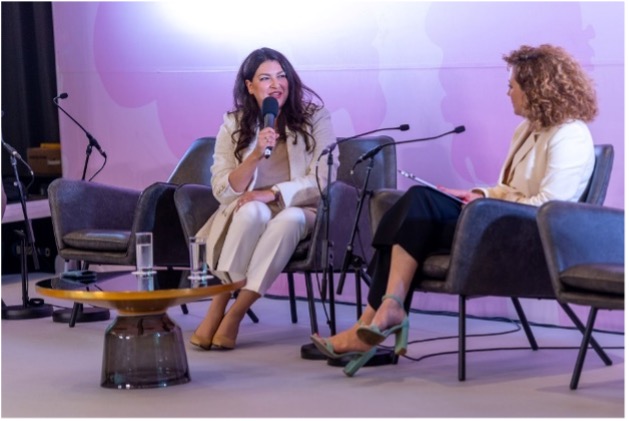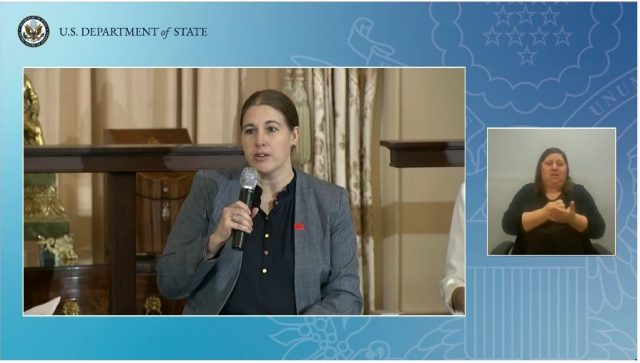The Center for International Private Enterprise (CIPE) is leading a new program with partners in 18 countries across Europe and Eurasia to strengthen women’s economic security and promote gender-responsive institutions. The efforts are part of a new initiative known as WE-Champs, short for “Strengthening the Entrepreneurial Ecosystem by Networking Regional Women’s Chambers of Commerce and Business Associations.” The project is funded by the U.S. Department of State’s Office of Global Women’s Issues (S/GWI) and recently gained international attention when Secretary of State Antony Blinken highlighted WE-Champs during the launch of the U.S. Women’s Economic Security Strategy.
“We will advance women’s economic competitiveness so that more women can fully participate and lead in all sectors, in all industries – including as CEOs and board members. One way we’re helping to do that is through programs like WE-Champs, which will provide technical assistance and training to women’s chambers of commerce and business associations in 18 countries across Europe to support women-owned small businesses,” said Secretary Blinken.
We will advance women’s economic competitiveness so that more women can fully participate and lead in all sectors, in all industries.
—U.S. Secretary of State Antony Blinken
WE-Champs officially launched in October and is already helping thousands of women through its support to partnering women’s business associations and chambers of commerce, as they work to lead and advocate for locally designed actions and measures intended to promote gender-responsive institutions and address the needs of women members, in all their diversity. Among the key focuses: addressing systemic barriers to women’s political and economic participation, as well as urgent challenges for women in business posed by COVID-19 and the war in Ukraine.

CIPE’s primary role is to provide leadership and technical training, drawing on its 40 years of experience addressing issues around economic inclusion, in addition to leveraging its longtime relationships with existing women’s business networks and local entities across the 18 countries. As the program moves forward, CIPE and WE-Champs will connect participating chambers and associations to form a region-wide network that can further help the organizations strengthen their advocacy platforms and foster local ownership.
Upcoming plans include working closely with eleven women’s business associations from Albania, Bosnia and Herzegovina, Bulgaria, Georgia, Kosovo, Moldova, Serbia, Slovakia, and Ukraine. All are planning to participate in a mid-March workshop in Bratislava, Slovakia. There will be mentorship opportunities with association experts and a small grants component to help organizations access additional resources for strengthening their internal processes and member services.
Among the attendees: The Association of Professional Business and Artisan Women, the Woman’s Economic Chamber in Albania, Association of Businesswomen in Bosnia and Herzegovina, the Association of Women Entrepreneurs in Bulgaria “Selena,” the Women Business Council of Georgia, the Association of Women in the Energy Sector of Kosovo, the Association of Women Entrepreneurs in Moldova, the Association of Businesswomen in Serbia, the Association of Business Women and Managers, Female Algorithm, as well as the Ukrainian Platform “Women in Business.”
In the coming months, CIPE will connect the group with more women’s organizations, including associations and chambers in other countries: Armenia, Azerbaijan, Estonia, Hungary, Latvia, Lithuania, Montenegro, Poland, and Romania. They will also begin to work with regional networks of women’s business associations. Among them: the South Asia Regional Network of Women Business Organizations (RNWBO), the Central American Women’s Business Network (CAWBN), the Coalition Of Women’s Business Associations in Romania (CAFA), and the Central Asia Women’s Economic Empowerment Network.
In late 2023, CIPE will launch an advocacy academy for women’s chambers and business associations to lead evidence-based campaigns for gender equity reforms in member-identified priority areas. It is anticipated that the advocacy efforts may include COVID-19 and war recovery, Ukrainian refugee response, and the care economy, among others.

Connie Gonzalez, Deputy Director for CIPE’s Center for Women’s Economic Empowerment (CWEE), explained some of the key needs that CIPE is working with colleagues to address: “We have heard from our partners about how women need quality care for family members; better access to financing, markets and resources; training and leadership opportunities; and support for safe digital transformations, so that they can participate more fully in the economy.”
“We have seen how when women in business are provided these support services, they are better able to address some of the pressing challenges of our time – like political conflicts, irregular migration, accountable investment issues, corruption, and gender-based violence at work. We have seen positive results when women in business are provided with opportunities to grow their businesses and their networks,” added Gonzalez.
CIPE and partners will be sharing many updates about progress with the WE-Champs organizational capacity building program, networking opportunities, and many other advocacy efforts to support women’s economic empowerment via the cipe.org website and social media channels Twitter, Facebook, and LinkedIn.
Published Date: March 01, 2023
